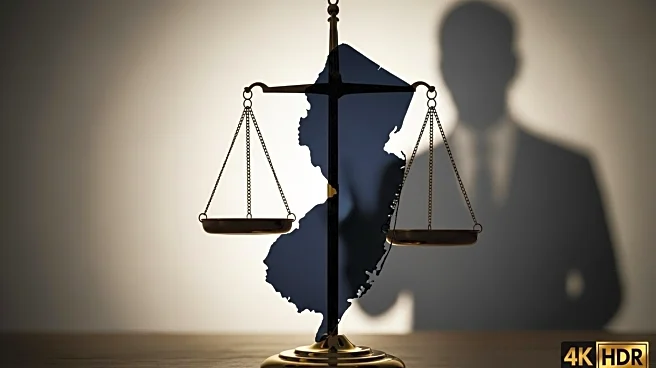What's Happening?
Democrat Mikie Sherrill and Republican Jack Ciattarelli are preparing for their opening debate in the New Jersey governor's race. This debate is significant as New Jersey is one of only two states with gubernatorial elections this fall, serving as a potential indicator of voter sentiment regarding President Trump's second term. The debate, held in a town-hall style, will allow Sherrill, a four-term congresswoman, and Ciattarelli, a former state Assembly member, to directly confront each other after previously criticizing each other from a distance. New Jersey has historically swung between Republican and Democratic governors during odd-year elections, often electing a governor from the party opposite the sitting president. Democratic Governor Phil Murphy broke this pattern in 2021 by narrowly winning reelection. Republicans hope to capitalize on voter fatigue with Democratic leadership, while Democrats are optimistic about Sherrill's appeal in Republican-leaning areas.
Why It's Important?
The debate is crucial as it could influence the political landscape in New Jersey, a state with a history of alternating party control in gubernatorial elections. The outcome may reflect broader national sentiments towards President Trump's policies, given Ciattarelli's alignment with Trump's agenda. Sherrill's strategy involves leveraging Trump's endorsement of Ciattarelli to sway voters who may be disenchanted with Trump's influence. The debate also highlights key issues such as rising costs, with Sherrill blaming tariffs imposed by the White House, while Ciattarelli attributes high taxes to Democratic governance. The candidates' differing approaches to energy policy and utility rate increases are also expected to be focal points, impacting New Jersey residents directly.
What's Next?
Following the debate, both candidates will likely intensify their campaigns, focusing on their strengths and addressing voter concerns. Ciattarelli may continue to seek support from the White House, while Sherrill might emphasize her military and prosecutorial background to appeal to voters. The debate's outcome could influence campaign strategies and voter turnout, potentially affecting the balance of power in New Jersey. Additionally, the candidates' positions on economic and energy issues will be scrutinized, with potential implications for state policy and voter preferences.
Beyond the Headlines
The debate underscores the broader implications of national politics on state elections, particularly the influence of President Trump's policies. It also highlights the strategic importance of candidate backgrounds and personal narratives in shaping voter perceptions. The focus on tariffs and taxes reflects ongoing economic challenges, with potential long-term impacts on New Jersey's fiscal health and energy policy. The candidates' differing views on transparency and governance may also influence public trust and engagement in the electoral process.










